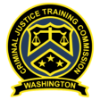BLEA Core Block Descriptions
Below is the syllabus for the Basic Law Enforcement Academy. These core blocks are covered during the 720 hour academy by training officers and subject matter experts.
A PDF version of this information is available for download - BLEA Syllabus July 2020.
Plato’s Guardians: Philosophical Warriors
The philosophical warrior class is an introduction to the Guardian mindset taught at the Basic Law Enforcement Academy. The Guardian mindset draws its inspiration from Plato’s Republic which is discussed in class. The class also uses the instructor’s personal and professional history to compare law enforcement agencies that espouse a warrior culture of policing versus agencies that strive to be more than just warriors. Students are taught about constitutional policing, the L.E.E.D. model of communication, and what it actually means to be a Guardian.
Criminal Investigations
Criminal Investigations is a broad subject taught by CJTC instructors and outside subject matter experts. Topics covered include, but are not limited to, crimes against children and vulnerable adults, sex crimes, death investigations, narcotics, gangs, and gambling offenses. Techniques for securing a crime scene and evidence collection are discussed and practiced during this block. Students also learn to request and serve a search warrant, conduct interviews, and identify suspects based on information obtained from witnesses. Trauma informed interviewing techniques are introduced here and will be taught in greater detail as a result of ongoing curriculum development. Report writing is used throughout this block to reinforce the lessons learned.
Criminal Law
The Criminal Law block of instruction focuses on the laws of the State of Washington as defined in the Revised Code of Washington (RCW) under Titles 9 and 9A as well as legal defenses. These classes provide detailed discussions on the most common crimes law enforcement will encounter, and the elements needed to establish their commission by an offender. The varying degrees of culpability (intent, knowledge, recklessness, negligence, and strict liability) are defined and applied throughout. The rights and culpability of juveniles are discussed here as well as how to appropriately handle missing juveniles and runaways. This block utilizes classroom instruction and written scenarios which provide the students with the necessary knowledge to appropriately apply the laws during practical scenarios in other areas of their training.
This block also covers domestic violence and court orders and is intended to teach students the impact of domestic violence on victims, families and communities, and provide them with knowledge of the relevant RCWs and court orders that can be used to accomplish the legislative intent to protect victims and hold batterers accountable. Students are taught how to recognize the dynamics of domestic violence, identify the primary aggressor, the importance of evidence collection and documenting injuries, enforce mandatory arrest provisions, and the potential for traumatic brain injuries to be present. A comprehensive review of court orders, their service and enforcement by law enforcement is accomplished through classroom instruction and written scenarios. The students then demonstrate their learning during mock practical scenarios.
Criminal Procedures
Criminal procedure is the way in which police officers lawfully do their job to ensure successful and legal prosecution of offenders. Criminal procedures are made from a network of laws, court rulings, and procedures that guide police. CJTC introduces students to the relevance of the US and Washington State Constitutions, the history of policing, the impact of perceptions and biases, and civil rights with regards to law enforcement. CJTC encourages students to become a part of and build trust with the communities they serve by meeting with their respective residents and learning about their cultures and needs. With these concepts in mind, recruits learn the proper and legal way to conduct contacts, how to perform a lawful search of person or vehicle, and the proper procedure for arrest and use of Miranda warnings. Recruits are also briefed on courtroom rules and etiquette, and police liability and immunity.
Crisis
The Crisis block of instruction focuses on the many ways a person may be in crisis, emphasizes the importance of communication, explains the role of emotional intelligence, and provides tools for de-escalation and safe response. Students are taught techniques to interpret verbal and non-verbal cues to ensure the best and safest outcome for the person in crisis and the officer. Each law enforcement officer is required to have eight hours of crisis intervention training (CIT). In addition, they receive an annual two-hour online refresher course. Expansion on the LEED model teaches students to Listen and Explain with Equity and Dignity in every contact they make. Students are encouraged to use these tools to build community trust and police legitimacy.
This block also informs students that anyone, including first responders, can be in crisis. Classes will discuss the stress law enforcement officers endure, sources of stress, how it may affect their personal and professional life, and how to prepare and recover from stress.
Patrol Tactics
The Patrol Tactics course of instruction is designed to provide students with the conceptual framework necessary to safely and ethically execute the duties of a law enforcement officer within the legal limits of their authority. As part of their training, students will use foundational knowledge and skills practice to develop proper officer safety tactics based on the Core Principles of: Legal Authority, Communication, Position and Movement, Threat Management, and Equipment Management. In order to preserve the sanctity of life for all parties involved, students will learn the application of objectively reasonable force as guided by Case Law, the U.S. and WA State Constitution regarding the use of force and force options when force becomes necessary in the performance of their duties. Students will also be taught Critical Life Saving Skills to perform life-saving intervention efforts to prevent blood loss thereby increasing treatment effectiveness provided by medical professionals. The classes in this block of instruction have a significant focus on de-escalation tactics and communication skills through classroom instruction and applied skills practical application.
Traffic
Most citizens’ first contact with law enforcement is usually during a traffic stop. The Traffic core block teaches students to recognize traffic violations and criminal offenses identified in Title 46 of the RCW. Students will be taught to effectively communicate violations and offenses verbally and through written citations. An emphasis on ethics and professionalism when conducting traffic stops is woven throughout the classes. Students will learn best practices for traffic stops and standardized field sobriety testing through classroom instruction and hands-on experience. Radio procedures are also reinforced during this block.
Washington State Patrol hosts students for three days of training on their Emergency Vehicle Operators Course (EVOC). While at the WSP training center, students learn the qualities of a good driver, basic vehicle knowledge for safe operation, and vehicle pursuit techniques through classroom instruction and practical application on a closed course track.
Control and Defensive Tactics
The control and defensive tactics program is designed for the ultimate goal of control. Control of the officer themselves, the situation, and the subject. Using a scientific approach to training methodologies and a principle and concept-based system, the student learns how to control the situation and/or subject using a wide range of reasonable techniques that cover all levels of force options. These force options include control holds, takedowns, belt tools, striking, pressure points and multiple officer tactics.
Cognitive Command (C2)
Cognitive Command (C2) Training is scientifically proven to be an effective mental mindset training that targets the subconscious/unconscious brain. The training works to expand officer’s field of perception, or awareness, and builds a structured system based on safety concepts to filter and process information. Perception and processing wired together at the subconscious level automatically guides behavior towards safer and better citizen interactions.
Over a decade of research and more than 30 research studies, show this training has a tremendous impact on officer mindset in areas including implicit bias, emotional intelligence, use of force decision making, confidence, control and resilience. But it has equally impressive impact on tactical behaviors, including firearms and tactical maneuvering.
Firearms
CJTC Firearms is a skills-based unit utilizing a building block approach with repetition to develop motor programming on which students can draw in stressful situations. The Firearms instruction uses a phased process of training delivered in 21 units (88 hours) of instruction. These units are taught combining classroom, and gym instruction, practical venue scenarios, simulators, and range and live fire drills. All phases emphasize proper decision making utilizing the de-escalation principles of time, distancing, and cover.
Phase 1 covers weapon handling fundamentals and marksmanship. Phase two includes in-depth instruction regarding movement, cover, speed, and close distance in real world scenarios and life-threatening situations. Phase 3 governs techniques to be applied during incidents requiring immediate action such as active shooter and other known threat events.



